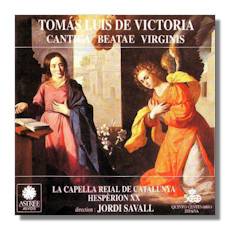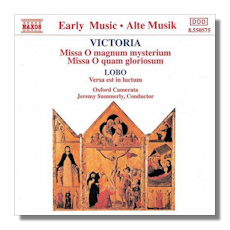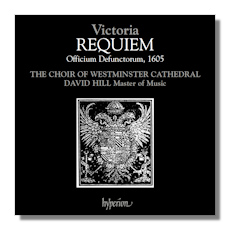
The Internet's Premier Classical Music Source
Related Links
-
Find CDs & Downloads
Amazon - UK - Germany - Canada - France - Japan
ArkivMusic - CD Universe
Find DVDs & Blu-ray
Amazon - UK - Germany - Canada - France - Japan
ArkivMusic-Video Universe
Find Scores & Sheet Music
Sheet Music Plus -
Recommended Links
Site News
Tomás Luis de Victoria

(c.1549 - 1611)
Tomás Luis de Victoria (c. 1548 - August 20, 1611) began his career as a choirboy in Ávila Cathedral, where he also likely he began studying the keyboard. In his maturity he studied the music of Italian and Iberian masters, including Palestrina, Morales, and Guerrero, becoming a leading composer of the Roman School.
Victoria published his first book of motets in 1572, followed by the Officium Hebdomadae Sanctae in 1585, a collection of motets and lamentations for Holy Week Catholic services. These works established Victoria as the most significant composer of the Counter-Reformation in Spain, and one of the most highly-regarded composers of sacred music in the late Renaissance. His masterpiece is the Requiem Mass "Officium defunctorum" for the Empress Maria.
Recommended Recordings
Motets
- "Cantica Beatae Virginis" - 11 Marian Motets/Astrée E8767
-
Jordi Savall/La Capella Reial de Catalunya & Hespèrion XX
- 18 "Responsories for Tenebrae" from Officium Hebdomadae Sanctae/Hyperion CDA66304
-
David Hill/Choir Of Westminster Cathedral
- 18 "Responsories for Tenebrae" from Officium Hebdomadae Sanctae/Gimell CDGIM022
-
Peter Phillips/The Tallis Scholars
- 18 Motets/Academy Sound & Vision CDGAU338
-
Andrew Hope/Victoria Voices & Viols
Masses (O Magnum Mysterium, etc)
- Masses and Motets "O magnum mysterium" & "O quam gloriosum"; Motets: "Ardens est cor meum" & "Ave Maria"/Naxos 8.550575
-
Jeremy Summerly/Oxford Camerata
- Mass & Motet "Vidi speciosam" and Motets: "Ave Maria", "Ave maris stella", "Ne timeas, Maria", and "Sancta Maria, succurre miseris"/Hyperion CDA66129
-
David Hill/Choir Of Westminster Cathedral
- Mass & Motet "Vidi speciosam" and Motets: "Ave Maria", "Ave maris stella", "Ne timeas, Maria", and "Sancta Maria, succurre miseris"/Hyperion CDA66129
-
David Hill/Choir Of Westminster Cathedral
- Mass & Motet "Ascendens Christus", Mass & Motet "O magnum mysterium"/Hyperion CDA66129
-
David Hill/Choir Of Westminster Cathedral
Requiem
- Requiem "Officium defunctorum" for 6 Voices (expanded version)/Hyperion CDA66250
-
David Hill/Choir Of Westminster Cathedral
- Requiem "Officium defunctorum" (short version); Funeral Motets "Versa est in luctum" by Victoria & Alonso Lôbo/Gimell CDGIM012
-
Peter Phillips/The Tallis Scholars
Amazon - UK - Germany - Canada - France - Japan - ArkivMusic - CD Universe
Or Reissued as part of Gimell CDGIM205:
Amazon - UK - Germany - Canada - France - Japan - ArkivMusic - CD Universe - Requiem "Officium defunctorum" for 6 Voices/Archiv Produktion 447095-2
-
Paul McCreesh/Gabrieli Consort
















